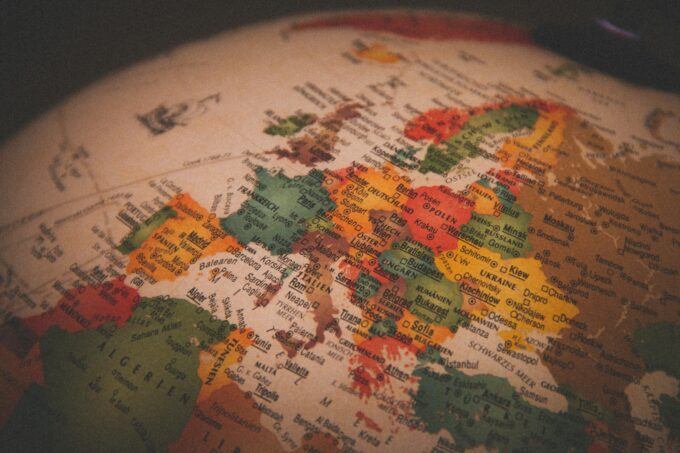
Image by Christian Lue.
The “Make America Great Again” project is no longer confined to U.S. domestic politics; it is expanding into Europe—not through direct military intervention, but via cultural, political, and economic penetration. Washington is determined to reconstruct Europe’s prevailing liberal order—not by collision, but by the soft re-engineering of policies and political currents—so that the continent becomes part of US’s project rather than an equal partner.
Europe today faces a cluster of crises: the rise (and normalization) of far-right parties; a gnawing decline of trust in Brussels-based institutions among segments of the electorate; and structural weaknesses in coordinating foreign, energy, and security policies among member states. These very conditions have created a unique opening for the Trump project to inject nationalist and anti-liberal ideas into the heart of European politics. What is taking shape is a vision in which Europe is redefined not as a partner, but as subordinate to Washington’s preferences.
Elimination, Conversion, Submission: Three gears of influence
Elimination means sidelining moderate currents by tilting the political marketplace toward hard-right and anti-liberal actors. The 2024 European Parliament election marked a structural inflection: hard-right forces gained unprecedented leverage after group reorganization, with the new 720-seat chamber reflecting a rebalanced right bloc in which the Patriots for Europe emerged as a major pole and the Europe of Sovereign Nations (ESN) group crystallized around Germany’s AfD.
This is not abstract Brussels numerology—it registers in capitals. Giorgia Meloni’s Brothers of Italy formed Italy’s government in 2022; Robert Fico’s SMER returned to power in Slovakia in 2023; and in the Netherlands a right-leaning coalition centered on Geert Wilders’s PVV initially elevated Dick Schoof as prime minister before collapsing in June 2025, shifting policy baselines.
At the level of public opinion, the picture is double-exposed: anxiety and attachment coexist. Eurobarometer data show more than six in ten EU citizens remain optimistic about the Union’s future even as doubts about direction simmer—fertile terrain for Trumpist narratives.
Conversion refers to resetting the rules of the economic game in ways that increase Europe’s dependence on U.S. markets, technologies, and regulatory gravity. The U.S. Inflation Reduction Act (IRA) has functioned as a magnet for green-industry investment—enticing capital with local-content provisions and direct production subsidies that Europe struggles to match. The EU’s response has included the Net‑Zero Industry Act (NZIA) and, on the security side, the European Defence Industrial Strategy (EDIS), both attempts to rebuild economic‑security muscle memory after a succession of external shocks.
Energy is the pressure point where conversion bleeds into submission. Since 2022, Europe has sharply increased its reliance on U.S. liquefied natural gas (LNG), a pivot that stabilizes supply while deepening exposure to U.S. price dynamics and methane‑rule bargaining—a live transatlantic fight as of autumn 2025.
Submission entails redefining the transatlantic alliance hierarchy so that Europe occupies a lower rung—an orbiting dependency rather than a co‑author of strategy. Donald Trump’s 2024 remark that he would encourage Russia to attack “delinquent” NATO allies internalizes uncertainty inside European decision‑making and tethers EU security planning to the temperament of a single American election cycle.
The culture‑war front is the solvent that loosens Europe’s normative joints. U.S. conservative networks have invested in a transatlantic infrastructure: CPAC’s Budapest editions, the roving National Conservatism conferences, and the Patriots for Europe summit in Madrid, themed “Make Europe Great Again.” The result is alignment: a shared vocabulary, donors, and playbooks that normalize illiberal governance as a legitimate Western alternative.
Why would Washington export this model? Among other reasons, economic statecraft works better if Europe tracks Washington’s line. The revival of sweeping U.S. tariff regimes in 2025—including a 10% “universal” baseline tariff and subsequent sector‑specific hikes such as a 25% levy on imported medium and heavy trucks, underscores the leverage that comes from European compliance—and the cost of divergence.
The implications are sobering. If unchecked, Europe could see a gradual erosion of democratic legitimacy, a hollowing out of institutional cohesion, and a rising strategic dependence on U.S. economic and security cycles. The continent would retain elections and institutions but lose authorship—governing in the passive voice, with policies increasingly written elsewhere.
There is a path away from this undertow. First, rebuild trust at home by meeting citizens where fear is: cost‑of‑living, housing, migration governance, and the anxieties of a just green transition. Second, lock in economic sovereignty with real instruments: fully implement NZIA’s permitting acceleration; design an EU‑level funding spine that avoids subsidy fragmentation; and finish the economic‑security toolkit—outbound‑investment screening, export‑control modernization, and R&D protections—on a pan‑EU basis. The Commission’s 2023–2025 economic‑security package sketches the blueprint; the next step is political will and budgetary ballast.
Third, convert defence awakening into capacity: make EDIS real with joint orders, common standards, and long‑horizon contracts—so Europe can deter without waiting anxiously for Washington’s calendar.
Fourth, inoculate the information sphere without aping censorship: fund pluralistic media, regulate platform opacity, and counter U.S.-exported disinformation pipelines through transparency and civic education rather than panic. Culture wars thrive in silence and scorn; they recede when democracies argue better.
Europe’s problem today is not just an electoral or partisan contest; it is bound up with the identity and future of the Western order. What is unfolding is a “soft coup”—quiet, incremental, yet deep and foundational. The MAGA project’s genius is that it does not need tanks or treaties to win; it only needs European drift. The alternative is neither anti‑Americanism nor strategic naïveté; it is adulthood—choosing to be a polity with its own center of gravity, capable of friendship without subordination, solidarity without surrender.
The post Washington’s Soft Coup: How MAGA Politics Are Rewriting Europe appeared first on CounterPunch.org.
From CounterPunch.org via this RSS feed


